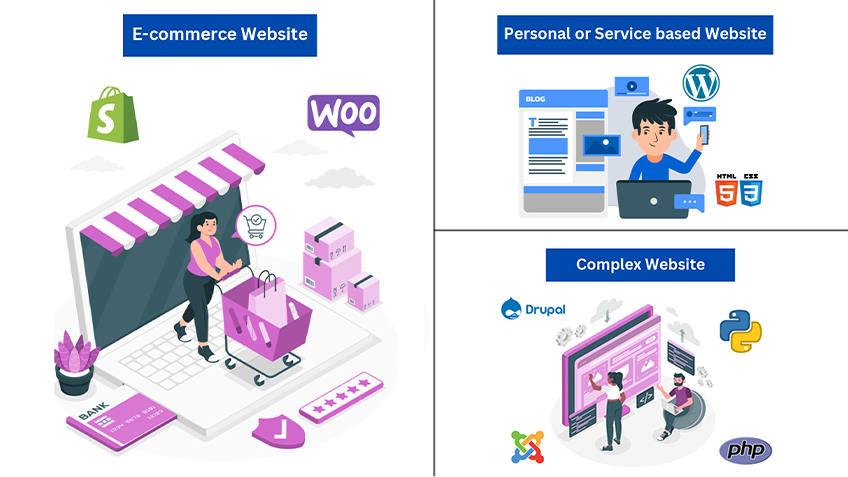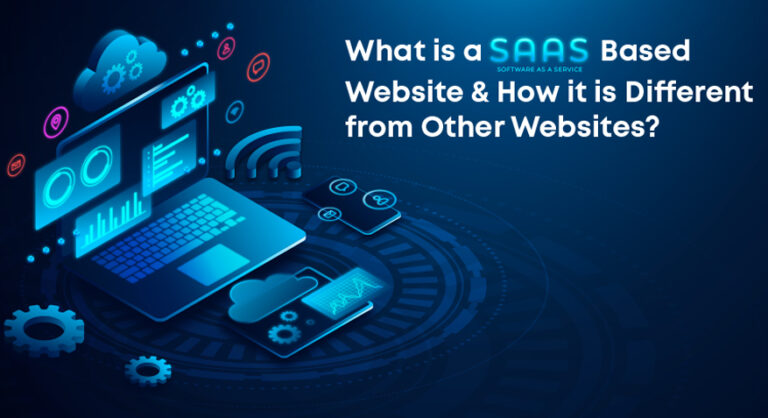When creating a website, one of the most important decisions is choosing the right platform and programming language. The choice largely depends on the type of website you’re building—whether it’s for business, e-commerce, or a portfolio.
Choosing a Platform for Business Websites
Business websites are used to showcase services, share information, and connect with customers. A good platform for a business website should be secure, flexible, and scalable as the business grows.
WordPress with Custom Development (PHP)
1. WordPress with Custom Development (PHP)
WordPress is one of the most widely used platforms for business websites, and it’s built with PHP. It offers flexibility with thousands of themes and plugins. If your business requires custom features, using PHP allows developers to build specific functionalities that meet your business needs.
Why choose WordPress with PHP?
- Customizable and scalable
- Ideal for blogs, corporate websites, and service pages
- Offers SEO tools for better online visibility
- Easy to maintain with a large community for support
2. Custom Development with Python
For businesses that need more control over functionality, Python is a highly adaptable language. Python is known for its simplicity and readability, which makes it great for building custom websites. It’s commonly used for business websites that handle large amounts of data or require advanced functionalities.
Why choose Python for your business site?
- Great for complex, data-heavy websites
- High flexibility and security
- Clean, easy-to-read code that is easy to maintain
3. Joomla for Mid-Sized Businesses
Joomla is an open-source platform suitable for mid-sized businesses that need a more robust website than WordPress but don’t require full custom development. It offers built-in flexibility for adding extra features and supports a range of plugins.
Why choose Joomla?
- Suitable for medium-sized businesses
- Flexible with built-in features
- Ideal for websites that need multilingual support
Platforms for E-Commerce Websites
E-commerce websites need more than just good design—they require secure payment systems, inventory management, and shopping carts. These platforms are designed to help you create an online store that’s functional, fast, and secure.
1. Shopify with Liquid Language
Shopify is a popular platform for e-commerce websites that makes setting up an online store straightforward. It uses a language called Liquid for its templates, which allows for some customization. Shopify is well-known for its built-in payment gateways and easy management of inventory, orders, and customers.
Why choose Shopify?
- Built specifically for e-commerce
- Secure payment processing
- Easy integration with payment gateways like Stripe and PayPal
- No need for deep coding knowledge
2. WooCommerce on WordPress with PHP
WooCommerce is a plugin for WordPress that transforms a regular website into an e-commerce store. Like WordPress, it is built with PHP, making it easy to customize. WooCommerce offers flexibility for those who need control over every part of their store.
Why choose WooCommerce?
- Completely customizable
- Great for small to medium-sized online stores
- Supports various payment gateways and shipping methods
3. Magento with PHP
Magento is designed for large-scale e-commerce stores with complex needs. It’s built using PHP and allows for full customization, making it perfect for businesses that need a scalable, robust platform to handle many products and customers.
Why choose Magento?
- Powerful platform for large online stores
- Highly customizable
- Supports multiple languages and currencies
Platforms for Portfolio or Personal Websites
If you’re a freelancer, artist, or someone who needs to showcase work, a portfolio website should be visually appealing and easy to navigate.
1. WordPress for Portfolios
WordPress remains one of the best choices for creating portfolio websites due to its simplicity and wide range of portfolio-specific themes. With plugins like Elementor or Gutenberg, you can build beautiful, professional portfolios without extensive coding knowledge.
Why choose WordPress for portfolios?
- Easy to manage and customize
- Offers many portfolio themes and templates
- Great for integrating blogs and social media
2. Custom HTML/CSS for Unique Portfolios
For those looking for a fully custom look and feel, building a portfolio website from scratch using HTML and CSS is a great option. This gives you complete control over the design, allowing for a truly unique site.
Why choose HTML/CSS?
- Full control over design and structure
- Lightweight and fast-loading
- No need for frequent updates
Platforms for Large or Complex Websites
For larger websites that handle heavy traffic or require advanced features, it’s essential to use platforms and languages that are scalable and efficient.
1. Drupal for Large Websites
Drupal is highly recommended for large-scale websites that need advanced features. It’s open-source and highly flexible, but it requires more technical expertise to set up and maintain. It’s often used for educational websites, government sites, and large organizations that need extensive control over content and functionality.
Why choose Drupal?
- Great for large websites with complex needs
- Offers advanced security features
- Highly customizable for content-heavy sites
2. Custom PHP Development
For large businesses or websites with highly specific requirements, custom development using PHP can be the best option. With PHP, you can create scalable, secure websites tailored exactly to your needs. This approach requires hiring experienced developers, but it allows for full flexibility and performance optimization.
Why choose Custom PHP?
- Full control over functionality and design
- Highly scalable for future growth
- Good for websites handling large amounts of traffic
3. Python (Django Framework)
Python, when used with the Django framework, is ideal for building large websites that need to handle complex processes or databases. Django is known for its simplicity and the fact that it helps speed up development without sacrificing performance.
Why choose Django?
- Excellent for data-heavy or complex sites
- Quick development with clean, organized code
- Scalable for growing businesses
By choosing the right platform or language from the start, you can save time and ensure that your website meets all of your business or personal needs.
Ready to build the perfect website for your business, e-commerce store, or portfolio? Let me help you choose the right platform and language that fits your needs and ensures your site’s success. Contact me today for expert guidance and personalized website development solutions.
Hire me – https://www.upwork.com/freelancers/sahilkaul1996
If you want to hire an agency please contact Digital Molecule.
What language is best for creating a business website?
PHP is great for business websites, especially if you use WordPress or custom development for more complex functionality.
Which platform should I use for a large online store?
Magento, built with PHP, is a powerful option for large-scale e-commerce websites.
Is Python good for building websites?
Yes, Python is excellent for building websites, especially when paired with frameworks like Django, which makes development faster and more secure.
What’s the difference between WordPress and custom development?
WordPress is easier to use for beginners and has many plugins for customization, while custom development gives you complete control but requires coding expertise.
Why choose Drupal for a large website?
Drupal offers high flexibility, advanced security features, and is perfect for content-heavy websites that require complex functionality.
If you're looking for any services regarding Digital Marketing or Website Developement, Please Contact now.






Leave a Comment